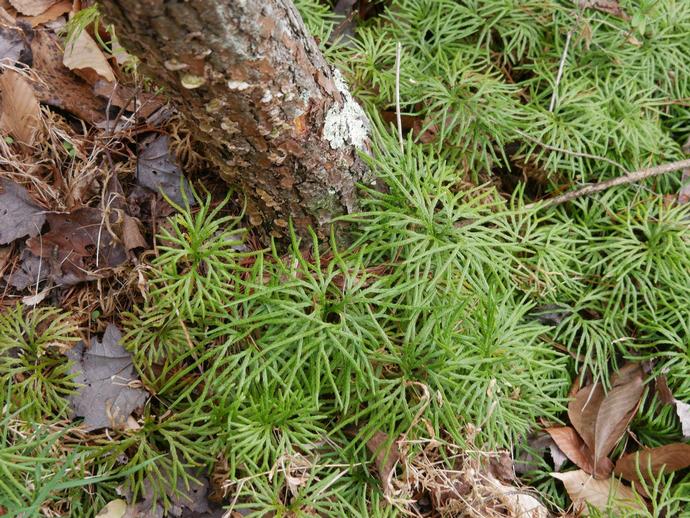December 20, 2020
We're reaching into the archives for today's #BenInNature update! The following post was originally published on April 26, 2020.
You've probably seen this plant before, carpeting the forest floor like some sort of ... carpet. This is Diphasiastrum digitatum, also known as ground cedar or fan clubmoss. Clubmosses like this one are lycopods, which is the oldest surviving division of vascular plants. The earliest lycopod fossils date back more than 400 million years! While the surviving members of the division are all pretty small, ancient lycopods from hundreds of millions of years ago resembled towering trees. If you've ever attended Dragon Festival at the Virginia Museum of Natural History, you're probably familiar with these unique plants. The museum's partners in the Dragon Research Collaborative at Roanoke College theorize that dragon myths originated when early humans found fossils of a type of giant lycopod known as Lepidodendron; the leaf scar patterns on the trunks of these plants resembled some giant, scaly beast, and imaginations ran wild.
Unlike most plants, Diphasiastrum digitatum produces neither flowers nor seeds. Instead, it produces spores that are contained in a cone-like structure. These spores have a high oil content which makes them highly flammable! These spores used to be collected and dried to make lycopodium powder, which was a primitive flash powder used for special effects in theatrical productions and early camera flashes, among other uses.
ABOUT #BenInNature
Social distancing can be difficult, but it presents a great opportunity to become reacquainted with nature. In this series of posts, Administrator of Science Ben Williams ventures outdoors to record a snapshot of the unique sights that can be found in the natural world. New updates are posted Monday - Friday, with previous posts highlighted on the weekends.
NEW: TRIVIA CHALLENGE
You've seen the posts. You've learned the facts. Now, it's time to prove you are a #BenInNature Mega Fan! The museum's education team has developed the #BenInNature Trivia Challenge to identify the most devoted fans out there! Everyone who successfully answers each trivia question correctly will be congratulated by having your own nature selfie posted to the museum's #BenInNature Mega Fan Photo Album on the official VMNH Facebook page! Learn more and download the trivia challenge today by visiting www.vmnh.net/research-collections/beninnature-trivia-challenge.
NATURE PHOTO IDENTIFICATIONS
If you discover something in nature that you would like help identifying, be sure to message us right here on Facebook with a picture (please include location and date of picture) and we'll have our experts help you identify it!

 Hours & Admissions
Hours & Admissions Directions
Directions

